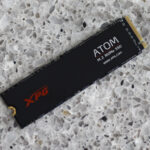An unexpected surprise arrived at our offices this Christmas break in the guise of a PCIe 4.0 DRAM-less SSD. It was only a matter of time but there has been some clever thought put into this drive. It is the ADATA XPG Atom 50 Gen 4 SSD and two things that stand out are that it is a single-sided SSD, …
Read More »Tag Archives: XPG
XPG GAMMIX S70 Blade NVMe M.2 SSD Review – 7GB/s at Low Temps in a 11th Gen Laptop
We have been testing a new SSD that is about to be introduced by XPG and something about this SSD caught our eye. It is in the XPG marketing pitch actually. A highlight of this marketing states that the XPG GAMMIX S70 Blade NVMe Gen 4 SSD is ‘Perfect for Compact and Thin Devices’ and that this SSD is ‘Cool …
Read More »XPG GAMMIX S70 2TB Gen4 NVMe M.2 SSD Review – As Fast as They Come
Perhaps one of the most admirable traits about ADATA and their gaming brand XPG throughout the years is their willingness to incorporate a wide range of SSD components in their products. We don’t think that there is another that comes remotely close, most latching on to a certain manufacturer and establishing long lasting partnerships. Thistrait is the case with respect …
Read More »XPG Gammix S50 Lite Gen4 NVMe SSD Review – A Cooler Low Cost Gen 4 SSD Appears
The latest and greatest in SSDs is PCIe 4 and the extreme performance that comes with it, presently showing off speeds up to 7GB/s. Accompanying these high power and rather expensive SSDs is something that we’ve really never had to tackle in the SSD industry, at least not to this extent…heat. At least up until today, Gen 4 SSDs had …
Read More »XPG Spectrix S40G RGB NVMe M.2 SSD Review (1TB)
On the test bench today is the XPG Spectrix S40G M.2 NVMe RGB SSD. RGB has become very popular in the last few years and the fact that this SSDs RGB package can be configured with XPG’s own software package is a bonus, as well as its configuration being part and parcel with some motherboards. As a storage reviewer, however, …
Read More »ADATA XPG SX8200 Pro 1TB NVMe SSD Review
If we look back at the last few months of SSD progression, it becomes rather evident that there is just a bit of a fist fight between competing SSD controller manufacturers, SMI and Phison. SMI has maintained a solid footprint in the industry for the last few years but most recently, Phison released its 5012-E12 controller which has gained quite …
Read More »ADATA Announces XPG SX8200 Pro and XPG GAMMIX S5 M.2 x 2280 SSDs and XPG GAMMIX D30 DDR4 Memory Modules
ADATA is announcing the launch of three new XPG high-performance gaming hardware items. ADATA’s XPG (Xtreme Performance Gaming) is a world-renowned gaming brand, and these two new XPG SSDs and XPG DDR4 memory take the XPG brand to yet another high level. The XPG XS8200 Pro is an M.2 x 2280 SSD, and represents XPG’s fastest SSD to date. It …
Read More »ADATA Announces XPG SX6000 Pro PCIe Gen3x4 M.2 2280 SSD
ADATA is announcing the launch of their new XPG SX6000 Pro PCIe Gen3x4 M.2 2280 SSD. The combination of 3D NAND Flash and the NVMe 1.3 protocol creates an SSD that delivers excellent performance and up to 1TB of capacity. The SX6000 Pro’s single-sided design results in a thinner-than-standard M.2 2280 SSD, providing a higher level of compatibility and a …
Read More »ADATA XPG Gammix S10 M.2 NVMe SSD Review (512GB)
Last year, ADATA’s gaming branch, XPG, released their newest product line, the Gammix series, and within that, they released the XPG Gammix S10 M.2 NVMe SSD. This SSD is quite sleek and high-end looking, with its flashy red with black heatsink and blacked out PCB, but its performance doesn’t quite match its looks. Although one would think that because it …
Read More »ADATA Announces XPG SX6000 PCIe Gen3x2 M.2 2280 SSD – Superb Cost-to-Performance Ratio
ADATA is announcing the launch of their latest consumer SSD, the XPG SX6000. The SX6000 is a PCIe Gen3x2 M.2 2280 form factor SSD, and it offers PCI Express storage performance at a price level comparable to a standard 2.5” form factor SSD. The SX6000 attains sequential read speeds of up to 1000MB/s, and sequential write speeds of up to …
Read More » The SSD Review The Worlds Dedicated SSD Education and Review Resource |
The SSD Review The Worlds Dedicated SSD Education and Review Resource | 

